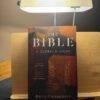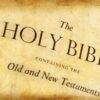Tag: Bible
Book Impression: The Bible: A Global History
Just finished. This is the third book of Bruce Gordon’s I have read over the years (his other books: on Calvin and Zwingli respectively). Overall, a good and informative and interesting read. It appears to me that, Bruce, at points, has imbibed too much of the higher critical palate when it comes to thinking of the supernatural nature of Scripture. His chapter on the Pentecostal appropriation of the Bible isn’t the strongest. But again, overall, I would commend this book to you. It will give you a greater appreciation for the Bible’s reception across the millennia and across the globe….
On a James Whitean and Leighton Flowersian Naked Reading of the Bible
Thumbnail created originally by Leighton Flowers (Caleb) I was listening to James White live today on his Dividing Line vlogcast, and what he reinforces over and over is that he is what some are calling a ‘biblicist,’ or what I would identify as a solo Scriptura or nuda Scriptura proponent, as far as the way that he approaches Scripture. In this way, James White and his archnemeses, Leighton Flowers, ironically affirm the same bibliology and its attending hermeneutic. It is both modern, postEnlightenment, and Lockean (i.e., tabula rasa) in orientation. That is, it sees Scripture and its reception in a…
Reading the Bible as a Christian: The Outer and Inner Reality of Scripture
Scripture has an outer logic and an inner logic. Back in the day this was referred to as its outer and inner clarity (perspicuity of Scripture). In some ways the rift between the disciplines of biblical studies and systematic theology pivots on which one of these the practitioner is focused on. That is to say, the biblical studies folks, typically focus on the outer components of the text; i.e., its grammar, philology, sitz im leben (e.g., historical situadedness), composition, transmission, and other “text critical” factors. Whilst the systematic theology folks focus more on the inner-theo-logic of the text; attempting to…
A Christological Reading of Holy Scripture Contra the neo-Marcionite “Bible Teachers” of the 21st Century
Let me be forthrightly clear: to follow a Christologically conditioned reading of Holy Scripture is not to be, at the same time, an implicit Marcionite. It is also not to suggest that the Old Testament history is simply the Hebrew peoples’ progressive knowledge of God, and thusly their writing thereof, as if it isn’t in fact heilsgeschichte, or the story of God’s in-breaking activity all throughout ‘salvation history,’ providentially and actively orienting and working through the events of said history in order to eventuate the actualization of his pre-destination in Jesus Christ to be for the world and not against…
The Christian Humanists versus the Scholastic Theologians: The Bible versus the Philosophers
Charles Partee in his book Calvin and Classical Philosophy, by way of introduction, offers a nice treatment on the entailments of a mediaeval Christian Humanism versus a theological Scholasticism, as both of those were present in the early formation of the Protestant Reformation; with, of course, particular reference to John Calvin. I am going to share a long passage from Partee because it is rather pertinent to the way I see myself operating; as far as both mood and method goes. I will provide the passage, and then offer up some closing thoughts (the usual). In the sixteenth century, however,…
ALL Interpreters of the Bible Are Theological Interpreters
Let me say another word about theological exegesis (I prefer that to theological interpretation of Scripture, as far as the language goes). I’m not sure I made myself as clear as I would like to have in my last post: everyone and anyone who attempts to interpret the Bible does so “theologically.” I don’t think this is appreciated enough, at all! In order for folks to appreciate this properly they might have to reorientate their thinking a bit. No matter what belief system, or belief reality someone is committed to, they bring this to the text of Scripture. So, if…
Reading the Bible Theologically versus Naturalistically
It has become almost self-evident that the way Christian persons are to interpret Holy Scripture comes from reconstructing history; through philological acumen; the ability to understand grammatical syntax, etc. While all of this, and more, is important towards culling the heft and riches of Scripture’s intent, in relation to its reality, Jesus Christ, it is not the only way to frame, nor I will suggest, the primary way we should approach the interpretation of the Bible. And since I want this post to be meaningful, in a contemporary sense, I want to focus, once again, on how the above has…




